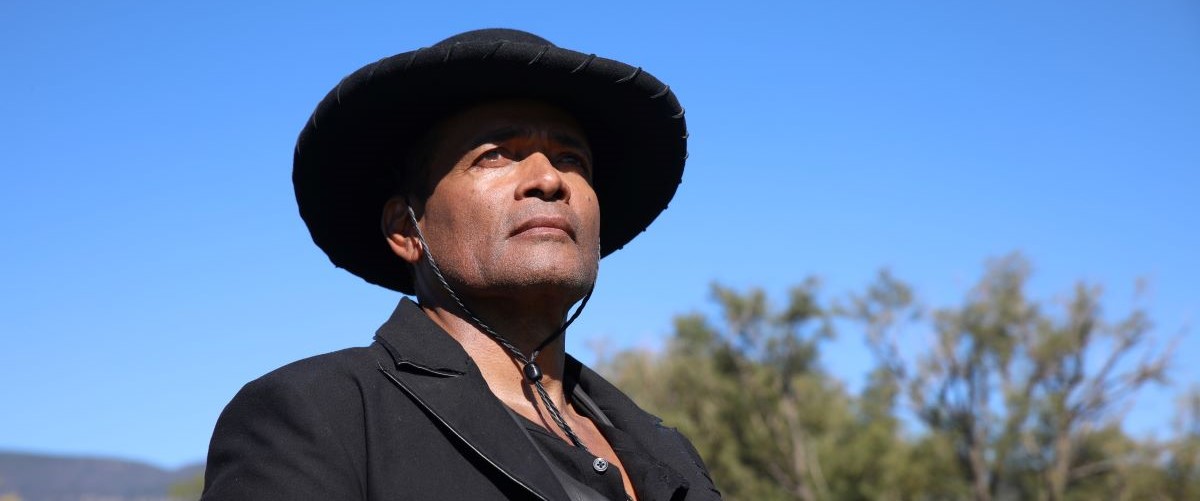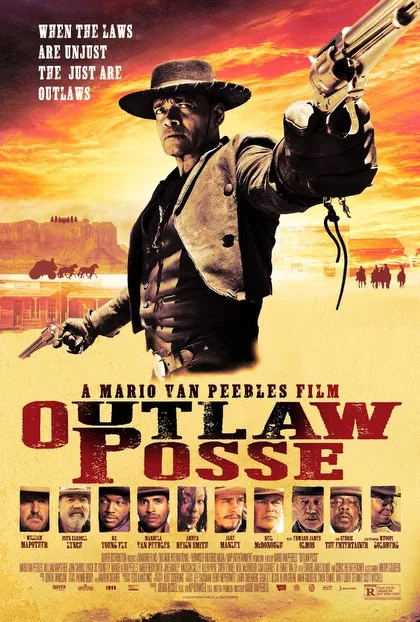Watching “Outlaw Posse,” you get the sense that writer-director Mario Van Peebles was asked to create a list of his favorite Westerns and then adapted that list into a screenplay. Throughout the film, there are any number of homages (and even the occasional outright lift) to such favorites of the genre as “The Wild Bunch,” “Butch Cassidy and the Sundance Kid,” “Blazing Saddles,” “Django Unchained” and, of course, all those blaxploitation oaters that Fred “The Hammer” Williamson made in the Seventies, most of them sporting titles that you will have to look up for yourself. Van Peebles clearly knows a good Western when he sees it, but he hasn’t quite made one himself as his effort proves to be an occasionally intriguing but too often unwieldy work that is unlikely to make anyone’s list of classic Westerns anytime soon.
That said, the opening scene is some kind of instant classic, the kind that could have worked as its own short film and which makes promises that the subsequent proceedings cannot quite deliver. In it, a group of grizzled guys (Neal McDonough, Cam Gigandet, the inevitable M. Emmet Walsh) turn up in a dusty and desolate New Mexico town circa 1908 and proceed to the local saloon for a drink. While there, one of them begins harassing and threatening an Indian customer until from out of the corner emerges Chief (Van Peebles), who proceeds to decimate the loudmouth, first verbally and then with his guns. It is a hugely entertaining sequence that serves as a visual nod to the classics of the genre while espousing ideas that were rarely seen or heard in such films.
We soon learn that in the immediate aftermath of the Civil War, he and Angel (William Mapother) were in charge of a shipment of Southern gold that was being sent out west, ostensibly to pay reparations to former slaves. Inevitably, the two had a falling out that resulted in Chief taking the gold—along with Angel’s hand—and burying it on tribal land that most whites feared to enter, making an arrangement with the tribal leader to return one day to safely retrieve it. The time is now at hand and Chief recruits a small gang, including the aging Carson (John Carroll Lynch), the young and callow Southpaw (Jake Manley), the sultry, knife-wielding mystic Queenie (Amber Reign Smith) and minstrel performer Spooky (D.C. Young Fly), who defends his work by observing “Make people laugh and you can get away with saying anything.”
Of course, Chief isn’t the only person who wants that gold, which leads to Angel and his gang arriving at the doorstep of Decker (Mandela Van Peebles), who just happens to be Chief’s estranged son. Although Decker hasn’t seen or heard from his father in years, Angel demands that he catch up with him and join his gang, thereby allowing Angel and his group to catch them and take both the gold and Chief’s hand for themselves. When Decker refuses, Angel burns his house down and kidnaps his beloved wife, Malindy (Madison Calley), to ensure his cooperation. While pursuing the gold, Chief and the others encounter any number of colorful characters and he and Decker tentatively begin to repair their relationship before the inevitable—Spoiler Alert—discovery of the treasure and—Spoiler Alert—eventual shootout.
“Outlaw Posse” is not Van Peebles’s first rodeo in this particular genre, having starred in and directed the 1993 film “Posse”—no relation to this film, whose title is essentially meaningless. That film was essentially a history lesson that found Van Peebles determined to remind viewers that there really were Black cowboys back in the day—a laudable notion except for the fact that he was so determined to remind them of this that he never quite got around to supplying an interesting story to go along with it. This time around, the historical lessons are presented in a more subtle manner, but he still hasn’t quite come up with a particularly compelling narrative. Most of the material is overly familiar, so much so that even the most potentially progressive conceit on hand—the notion that those disenfranchised because of race, creed, gender or economic status need to stop fighting amongst themselves and band together to battle their common enemy—is the same one that helped make “Blazing Saddles” more than just a collection of jokes. Perhaps to cover up the lack of a strong narrative, Van Peebles has his characters espouse more contemporary viewpoints in ways that are presumably meant to supplant the old genre tropes, but which are only occasionally interesting or edifying. More troubling, he also employs a frantic visual style throughout, employing a constantly moving camera and quick edits in ways that prove to be only distracting.
And yet, even though the film never quite comes together into a satisfying whole, it is never boring, and I found myself enjoying a number of the individual elements on display. I have already spoken of the genius of the opening sequence and there are a couple of others that are almost as good, including one where Chief’s gang robs a local bank by utilizing an approach that I will leave for you to discover and one where they come across a multicultural community run by one of Chief’s old associates (Cedric the Entertainer) that is like a more bucolic version of Bartertown from “Mad Max Beyond Thunderdome.” Although there are a couple of distracting cameos from the likes of Whoopi Goldberg and Edward James Olmos, most of the main performers acquit themselves nicely—I especially liked Lynch as the wise-but-weary Carson and Smith as the wild card Queenie. I also liked Van Peebles’ work in front of the camera as well—he cuts a dashing figure that is clearly reminiscent of the aforementioned Fred Williamson, and he looks perfectly at home in a milieu that not many contemporary actors can convincingly convey these days.
“Outlaw Posse” doesn’t quite work in the end but there are enough moments of note scattered throughout it to let you forget that from time to time. It never hits the heights reached by the films it evokes and it even pales in comparison to such recent takes on the genre as Walter Hill’s often-stunning and sadly overlooked “Dead for a Dollar.” That said, it isn’t as if the multiplexes are currently overflowing with Westerns, so if you have a particular fascination for the genre and do not want to wait for the release of the first two of Kevin Costner’s “Horizon” films this summer, you might get a kick out of some of it, assuming you go in with lowered expectations.




















